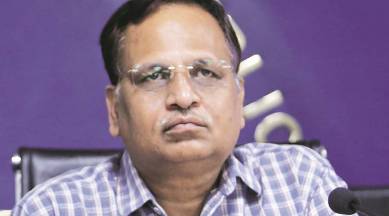Stay updated with the latest - Click here to follow us on Instagram
Money laundering case: Don’t have control over companies being probed, Satyendar Jain tells Delhi HC
The high court observed that a case will have to be made out by Jain to satisfy the court that there are reasonable grounds for believing that no offence is made out against him and satisfy the twin conditions under Section 45 of the PMLA.

Jailed Aam Aadmi Party (AAP) leader Satyendar Jain, seeking bail before the Delhi High Court, said Thursday that he does not have control over the companies that he is alleged to have used for money laundering in a 2017 probe being investigated by the Enforcement Directorate (ED). It was the ED’s case before the trial court that the companies under investigation were only paper companies that did not earn any income and that Jain was in control of these.
Appearing for Jain, senior advocate N Hariharan began his arguments and said the check period in ED’s case is between February 14, 2015, and May 31, 2017, which is also mentioned in the chargesheet filed in 2018.
monthly limit of free stories.
with an Express account.
“Anything beyond the check period cannot be taken into consideration, it is the predicate offence alone which matters. The generation of proceeds of crime will happen only after the predicate/scheduled offence is committed, which is to be committed in the said check period,” he said. Hariharan had previously argued before the high court that there are no proceeds of crime generated and the trial court had made out an entirely new case in the impugned order.
Drawing attention to certain dates involved in the case, Hariharan told the court that on August 24, 2017, the Central Bureau of Investigation (CBI) registered a case alleging predicate offence committed (by Jain) under Section 13(2) and Section 13(1)(e) of the Prevention of Money Laundering Act (PMLA) along with provisions of the Indian Penal Code. On August 31, 2017, an ECIR (ED’s case) was filed in pursuance of this predicate offence. On July 6, 2019, regular bail was granted without being arrested in predicate offence.
“I was summoned on seven different occasions in the past five years, and each time I joined the investigation. On May 30, 2022, the last time I was asked to join the investigation, I was arrested. At the time, there was no allegation of tampering of evidence against me,” Hariharan contended.
The high court observed that a case will have to be made out by Jain to satisfy the court that there are reasonable grounds for believing that no offence is made out against him and satisfy the twin conditions under Section 45 of the PMLA.
The court further questioned if it can, while hearing a bail application, return a finding that cognizance taken by the trial court is wrong. To which Hariharan said if that were true, nobody would be entitled to bail.
According to Section 45 of the PMLA, twin conditions have to be satisfied for granting bail. It states that no person accused of an offence shall be released on bail or on his own bond unless the public prosecutor is given the opportunity to oppose the application for such release and where the public prosecutor opposes the application, the court is satisfied that there are reasonable grounds for believing that the accused is not likely to commit any offence while on bail.
The CBI had filed a case in August 2017 under the Prevention of Corruption Act and a year later filed a chargesheet against Jain, his wife, and four of his associates in the disproportionate assets case. Following this case, the ED had provisionally attached immovable properties worth Rs 4.81 crore belonging to Akinchan Developers Pvt Ltd, Indo Metal Impex Pvt Ltd, Paryas Infosolutions Pvt Ltd, Manglayatan Projects Pvt Ltd, and JJ Ideal Estate Pvt Ltd.
The trial court in its November 17 decision rejected Jain’s bail plea observing that it “has prima facie come on record that he was actually involved in concealing proceeds of crime by giving cash to Kolkata-based entry operators, and bringing the cash into three companies”.
The high court asked on Thursday, “Suppose if a company does money laundering, then will a case be filed against the company? Against the directors?”
Hariharan replied that a case may be filed against the directors, however, in the present case, Jain was not a director and did not have a majority stake.
“I am not a shareholder during the check period. I cannot have control over the companies. The stake that my wife has is minuscule. Will there be a special law just because he is Satyendar Jain?” Hariharan submitted.
After hearing the matter for some time, the high court listed it for hearing on January 17 at 2.30 pm.